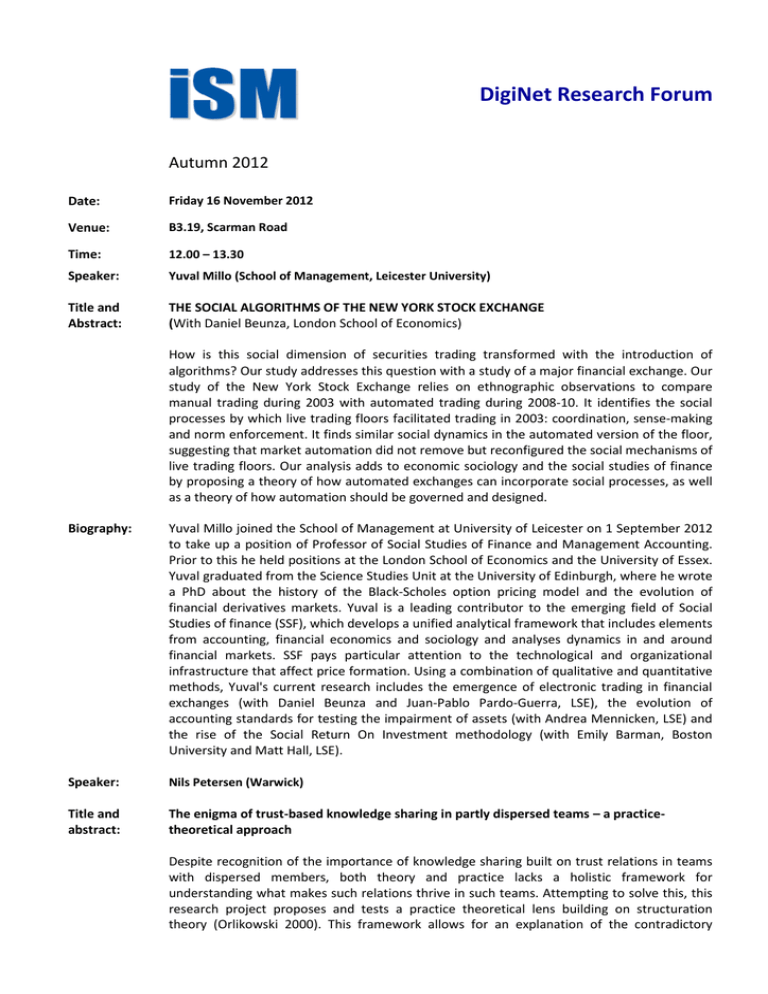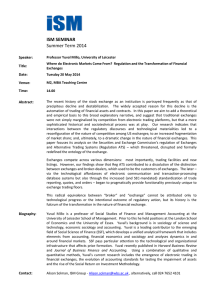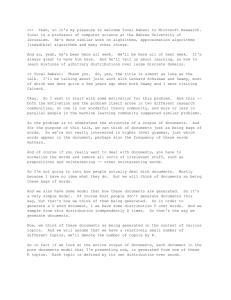DigiNet Research Forum Autumn 2012 Date: Venue:
advertisement

DigiNet Research Forum Autumn 2012 Date: Friday 16 November 2012 Venue: B3.19, Scarman Road Time: 12.00 – 13.30 Speaker: Yuval Millo (School of Management, Leicester University) Title and Abstract: THE SOCIAL ALGORITHMS OF THE NEW YORK STOCK EXCHANGE (With Daniel Beunza, London School of Economics) How is this social dimension of securities trading transformed with the introduction of algorithms? Our study addresses this question with a study of a major financial exchange. Our study of the New York Stock Exchange relies on ethnographic observations to compare manual trading during 2003 with automated trading during 2008-10. It identifies the social processes by which live trading floors facilitated trading in 2003: coordination, sense-making and norm enforcement. It finds similar social dynamics in the automated version of the floor, suggesting that market automation did not remove but reconfigured the social mechanisms of live trading floors. Our analysis adds to economic sociology and the social studies of finance by proposing a theory of how automated exchanges can incorporate social processes, as well as a theory of how automation should be governed and designed. Biography: Yuval Millo joined the School of Management at University of Leicester on 1 September 2012 to take up a position of Professor of Social Studies of Finance and Management Accounting. Prior to this he held positions at the London School of Economics and the University of Essex. Yuval graduated from the Science Studies Unit at the University of Edinburgh, where he wrote a PhD about the history of the Black-Scholes option pricing model and the evolution of financial derivatives markets. Yuval is a leading contributor to the emerging field of Social Studies of finance (SSF), which develops a unified analytical framework that includes elements from accounting, financial economics and sociology and analyses dynamics in and around financial markets. SSF pays particular attention to the technological and organizational infrastructure that affect price formation. Using a combination of qualitative and quantitative methods, Yuval's current research includes the emergence of electronic trading in financial exchanges (with Daniel Beunza and Juan-Pablo Pardo-Guerra, LSE), the evolution of accounting standards for testing the impairment of assets (with Andrea Mennicken, LSE) and the rise of the Social Return On Investment methodology (with Emily Barman, Boston University and Matt Hall, LSE). Speaker: Nils Petersen (Warwick) Title and abstract: The enigma of trust-based knowledge sharing in partly dispersed teams – a practicetheoretical approach Despite recognition of the importance of knowledge sharing built on trust relations in teams with dispersed members, both theory and practice lacks a holistic framework for understanding what makes such relations thrive in such teams. Attempting to solve this, this research project proposes and tests a practice theoretical lens building on structuration theory (Orlikowski 2000). This framework allows for an explanation of the contradictory findings within the literature on virtual, dispersed and hybrid teams, by focusing on how the team enacts and impacts on the structures in which they are embedded. The contradictions in the literature arise from looking at the impact of individual factors on these teams, such as team and management practices, culture(s) in the organisation), the technologies used and the interpersonal relations in the team. From a moderate constructionist standpoint, the project posits that it is the teams’ perceptions of the unique interplay of these factors within the specific organisational context which determine the success of trust-based knowledge sharing in partly dispersed teams. Preliminary results from an on-going case study in a global human resource and business development consultancy illustrate the usefulness of the framework in practice. Contact: Alison Solman, ISM Group Alison.solman@wbs.ac.uk




